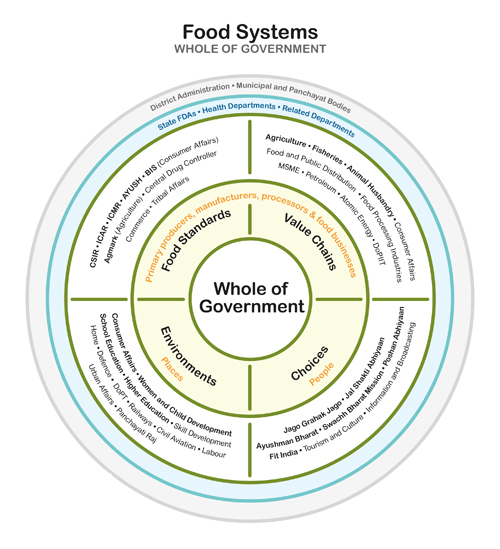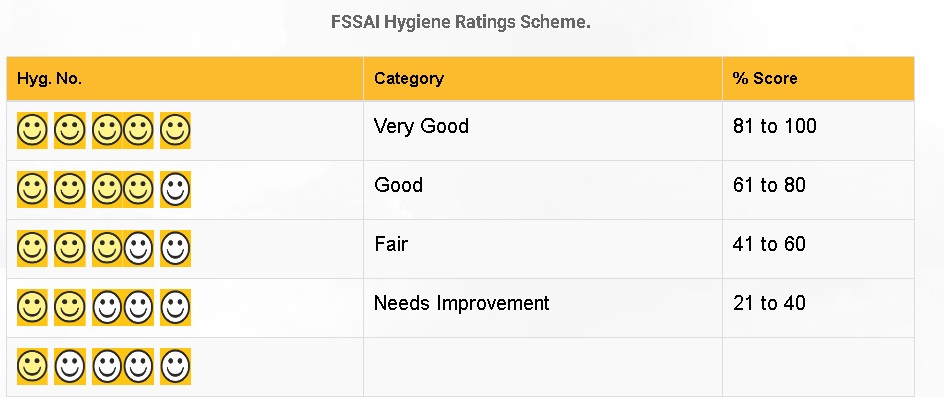[mc4wp_form id=”2320″]
Arun Singhal, CEO, FSSAI: Our technology-driven voluntary Hygiene Rating Scheme for food service establishments is getting a great response

Arun Singhal, CEO, Food Safety and Standards Authority of India (FSSAI), belongs to the 1987 Batch of Indian Administrative Service. With his vast experience as Additional Secretary in MoHFW, he has been proactively working towards Drugs & Food Regulation, medical education, implementation of Pradhan Mantri Swasthya Suraksha Yojana (PMSSY) under which new AIIMS are being set up in the country, and in administration and expansion of Institutes of National Importance like AIIMS Delhi, PGI Chandigarh and JIPMER Puducherry.
In an exclusive interview with Steena Joy, Singhal elucidates on adapting to food hygiene standards in the New Normal and the future roadmap for FSSAI.
How have food safety and hygiene standards changed in the New Normal’?
Food safety and hygiene standards are essential in all circumstances to avoid any food-borne illnesses. The prevailing pandemic situation has only increased its scope. Today, we see increased awareness amongst people about food safety and hygiene while, at the same time, the food industry is adopting the best possible practices to ensure food safety, hygiene and safe supply of food items.
The Food Safety and Standards Authority of India (FSSAI) has taken the necessary steps to ensure uninterrupted food services/supply and has facilitated the continuity of food business operations during the prevailing Covid-19 outbreak. FSSAI has already reiterated and clarified that import clearances of food items and testing services by FSSAI’s notified laboratories (including both public and private laboratories) are Essential Services.
For the rapid expansion of logistic supply chains, catering, warehouses, retail outlets and food service establishments, we have laid down directions permitting the Food Business Operators other than manufacturers to temporarily run/manage their businesses based on a valid receipt of FSSAI license/ registration application.
On the other hand, manufacturers are allowed to increase/ enhance their capacity, on the basis of a valid receipt of FSSAI license/ registration application to enable immediate scaling up of production facilities without waiting for state regulatory approvals. It has also been directed that all routine inspections can be done online except in case of high risk food products viz. Milk and milk products, slaughter houses, meat and meat products etc.
However, food safety authorities can conduct inspections in case of select cases on the basis of risk profiling or in case of any food emergency/ incidents and complaints. Wherever possible, inspections can be done by e-inspection. These measures are applicable till 30.06.2021 and shall cease after 30.06.2021 irrespective of the status of lockdown/ curfew/ containment at any location.
FSSAI has written to all the states to ensure that there is no interruption of food supply chains during this period and also the regulatory compliance requirements are not an impediment for smoother operations of food businesses.
FSSAI, through its flagship training programme FOSTAC, is providing trainings to food business operators on Covid appropriate practices in food industry. Till date more than two lakh sixty seven thousand eight hundred ninety four ((2,67894) ) food handlers have been trained and certified for Covid-19 training sessions. The initiative needs to be promoted to ensure Covid appropriate behaviour in the food industry so as to maintain food safety and hygiene protocols during this pandemic period.
What has been the response to FSSAI’s scheme to approve Hygiene Rating agencies?
Hygiene Rating is a voluntary scheme meant for food service establishments and we have been getting great response from them so far. It is a technology-driven, user-friendly scheme where food establishments are given a rating on a scale of 1-5, where 5 indicates Excellent compliance and 1 indicates poor compliance of food hygiene and safety standards.
Ratings are displayed in the form of symbols i.e. Smileys. This scheme encourages food businesses to ensure high standards of hygiene and sanitation and allows consumers to make informed food choices. This scheme is currently applicable to restaurants, cafes, bistros, fine diners and other eating-places, sweet shops, bakeries and meat shops. It will benefit everyone as a whole because improved hygiene standards mean fewer instances of food-borne illnesses.
It is the prerogative of the consumer to demand safe and hygienic food. With this certificate, consumers can do a quick check of hygiene rating when they visit any restaurants and encourage them to apply for the same if the food service establishment is not aware of hygiene rating scheme. This will truly impact the dining out experience for customers.
We are also collaborating with our State Food Safety departments to initiate the drives on this program at their level and so far, over 1800 food service establishments have applied for this certification voluntarily. Media being so powerful should write more about this wonderful scheme to spread awareness amongst the food service establishments as well as consumers. I am confident that this will grow multi-fold as we move forward and the situation improves.
Click here for the guidance document: https://eatrightindia.gov.in/hygieneRating/resources/pdf/guidance_doc_new.pdf
How does FSSAI collaborate with the Quality Council of India? What are the synergies?
FSSAI believes that food safety is a shared responsibility. We have been continuously engaging with different stakeholders to bring synergies across initiatives. Through our collaboration with Quality Council of India (QCI), we are significantly improving the ecosystem of third party auditors for conducting hygiene rating audits.
QCI has come out with a Scheme for approval of Hygiene Rating Audit Agencies to scale up Hygiene Rating by increasing the number of recognised Hygiene Rating Audit Agencies in the country under their ambit. The recognised Hygiene Rating Audit Agency will verify the compliance by the FBOs with food hygiene and safety procedures laid by FSSAI.
Details of the scheme is available on QCI’s website.
What is the immediate future roadmap for FSSAI?
- Our clear objective is to ensure that citizens have access to safe and wholesome food. In order to achieve this, we are working towards various regulatory reforms for enhancing efficiency and the ‘Ease of doing Business’ for the Food Business Operators (FBOs).
- IT enabled resources are being used for improvement of our existing portals of licensing & registration, food imports and laboratories’ network along with better delivery of various e-services including e-applications and e-inspections, thus enhancing the range of e-governance.
- We are institutionalising and upgrading the scope of market surveillance to identify hot-spot areas of adulteration and conduct national-level surveys for milk, vegetable oils and other high risk commodities.
- Another core area of focus is improving the infrastructure and capacity of food testing laboratories and development of new National Food Laboratories (NFLs) at Chennai/ Mumbai.
- We are actively investing our efforts around training and capacity building for Food Safety Officers (FSOs) and field staff as well as increasing the manpower at FSSAI headquarters and across regional offices. We are also strengthening our Food Import Clearance System in order to ensure that only quality products, compliant with our standards are imported into the country.
- We are going to remain focused on improving our connect with the States/UTs by means of regular meetings through video conferencing and visits involving meetings with the regulatory staff, food businesses, training and audit partners as well as other important stakeholders and engaging with Chief Secretaries and Health Ministers of States/UTs to have a better coordination at the ground-level. This has helped a lot in improving the overall food safety ecosystem in the country and our efforts in this regard will continue. We are also providing technical and financial assistance to States/UTs for creation of necessary infrastructure, testing equipment and mobilising resources for carrying out special camps, inspections, awareness drives, etc.
- Through the ‘Eat Right India’ campaign, launched in 2018, FSSAI will continue to ensure provision of safe food and healthy diets to the consumers. Initiatives such as ‘Eat Right Campus’ for consumers in workplaces, institutions, hospitals, jails and tea estates; ‘Eat Right School’ for school children and the ‘Eat Right Toolkit’ for front-line health workers to reach people at the grass-root level have been institutional for influencing behaviour of people.
- Recently launched ‘Eat Smart Cities Challenge’ is galvanising a large number of stakeholders from over 100 smart cities. As we move forward, we plan to expand the reach of these initiatives in different parts of the country and (transform/enhance) people’s behaviour towards right eating habits.

Leave a Reply
You must be logged in to post a comment.
